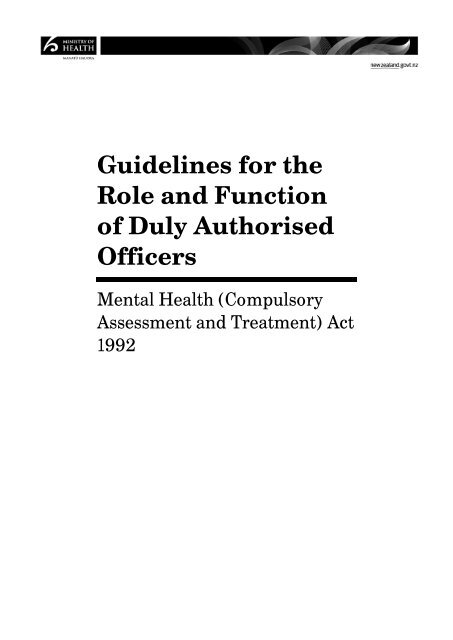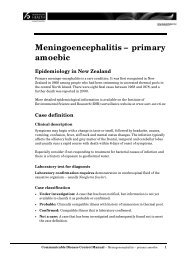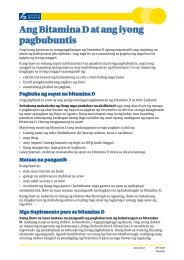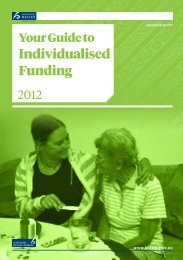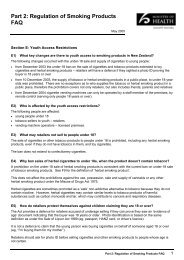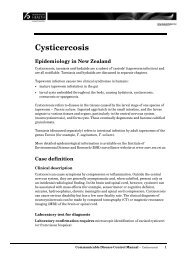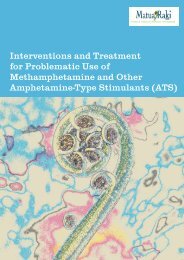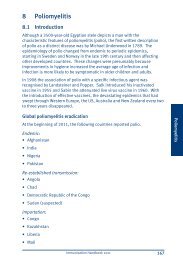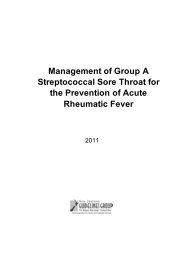Guidelines for the Role and Function of Duly Authorised Officers (pdf ...
Guidelines for the Role and Function of Duly Authorised Officers (pdf ...
Guidelines for the Role and Function of Duly Authorised Officers (pdf ...
You also want an ePaper? Increase the reach of your titles
YUMPU automatically turns print PDFs into web optimized ePapers that Google loves.
<strong>Guidelines</strong> <strong>for</strong> <strong>the</strong><strong>Role</strong> <strong>and</strong> <strong>Function</strong><strong>of</strong> <strong>Duly</strong> <strong>Authorised</strong><strong>Officers</strong>Mental Health (CompulsoryAssessment <strong>and</strong> Treatment) Act1992
DisclaimerWhile every care has been taken in <strong>the</strong> preparation <strong>of</strong> <strong>the</strong> in<strong>for</strong>mation in this document,users are reminded that <strong>the</strong> Ministry <strong>of</strong> Health cannot accept any legal liability <strong>for</strong> anyerrors or omissions or damages resulting from reliance on <strong>the</strong> in<strong>for</strong>mation contained inthis document.Please note that <strong>the</strong>se guidelines are not intended as a substitute <strong>for</strong> in<strong>for</strong>med legalopinion. Any concerns individuals may have should be discussed with appropriate legaladvisors.Published with <strong>the</strong> permission <strong>of</strong> <strong>the</strong> Director-General <strong>of</strong> Health, pursuant tosection 130(a) <strong>of</strong> <strong>the</strong> Mental Health (Compulsory Assessment <strong>and</strong> Treatment) Act 1992.Citation: Ministry <strong>of</strong> Health. 2012. <strong>Guidelines</strong> <strong>for</strong> <strong>the</strong> <strong>Role</strong> <strong>and</strong> <strong>Function</strong> <strong>of</strong> <strong>Duly</strong><strong>Authorised</strong> <strong>Officers</strong>: Mental Health (Compulsory Assessment <strong>and</strong> Treatment) Act 1992.Wellington: Ministry <strong>of</strong> Health.Published in November 2012 by <strong>the</strong>Ministry <strong>of</strong> HealthPO Box 5013, Wellington 6145, New Zeal<strong>and</strong>ISBN 978-0-478-40202-5 (print)ISBN 978-0-478-40205-6 (online)HP 5581This document is available at www.health.govt.nz
ContentsIntroduction 11 <strong>Duly</strong> authorised <strong>of</strong>ficers 21.1 Appointment <strong>of</strong> duly authorised <strong>of</strong>ficers 21.2 <strong>Role</strong> <strong>of</strong> duly authorised <strong>of</strong>ficers 22 Statutory functions <strong>of</strong> duly authorised <strong>of</strong>ficers 32.1 Section 37: Providing general advice or assistance 32.2 Section 38: Providing assistance when a person may need assessment 32.3 Section 8A: Making application <strong>for</strong> assessment 52.4 Section 9: Arranging an assessment examination 52.5 Section 39: Assisting with outpatients <strong>and</strong> inpatients on leave 72.6 Section 40: Taking or returning patient to place <strong>of</strong> assessment or treatment 82.7 Returning patients absent without leave 82.8 Section 41: Requesting assistance from Police 82.9 Advice <strong>and</strong> assistance to medical practitioner in emergency 92.10 Section 111: A nurse’s power to detain 93 Statutory guidance when exercising powers under <strong>the</strong>Mental Health (Compulsory Assessment <strong>and</strong> Treatment)Act 1992 113.1 Respect <strong>for</strong> cultural identity <strong>and</strong> personal beliefs 113.2 Section 6: Interpreters to be provided 123.3 Section 122B: Use <strong>of</strong> <strong>for</strong>ce in exercising powers 123.4 Powers to be exercised with respect <strong>for</strong> rights <strong>of</strong> patients <strong>and</strong> proposedpatients 133.5 Section 93: Specific statutory requirements <strong>for</strong> duly authorised <strong>of</strong>ficers 143.6 O<strong>the</strong>r relevant sections <strong>of</strong> <strong>the</strong> Mental Health (Compulsory Assessment <strong>and</strong>Treatment) Act 1992 144 <strong>Duly</strong> authorised <strong>of</strong>ficer appointment criteria 164.1 Knowledge 174.2 Skills 184.3 Attitude 19<strong>Guidelines</strong> <strong>for</strong> <strong>the</strong> <strong>Role</strong> <strong>and</strong> <strong>Function</strong> <strong>of</strong> <strong>Duly</strong> <strong>Authorised</strong> <strong>Officers</strong>iii
5 Selecting <strong>and</strong> monitoring duly authorised <strong>of</strong>ficers 205.1 Selecting duly authorised <strong>of</strong>ficers 205.2 Monitoring duly authorised <strong>of</strong>ficers 205.3 Employers’ obligations 21iv<strong>Guidelines</strong> <strong>for</strong> <strong>the</strong> <strong>Role</strong> <strong>and</strong> <strong>Function</strong> <strong>of</strong> <strong>Duly</strong> <strong>Authorised</strong> <strong>Officers</strong>
IntroductionSection 130(a) <strong>of</strong> <strong>the</strong> Mental Health (Compulsory Assessment <strong>and</strong> Treatment) Act 1992(<strong>the</strong> Act) states that <strong>the</strong> Director-General <strong>of</strong> Health may issue guidelines <strong>for</strong> <strong>the</strong>purposes <strong>of</strong> <strong>the</strong> Act. This document provides guidance to mental health cliniciansacting as duly authorised <strong>of</strong>ficers (DAOs). It updates <strong>the</strong> previous guidelines issued inApril 2000, to reflect changes in practice <strong>and</strong> statutory interpretation.DAOs are <strong>the</strong> frontline statutory <strong>of</strong>ficers <strong>of</strong> <strong>the</strong> Act, <strong>and</strong> are expected to be <strong>the</strong> firstpoint <strong>of</strong> contact <strong>for</strong> mentally distressed persons in <strong>the</strong> community <strong>and</strong> those peopleconcerned about <strong>the</strong> mental health <strong>of</strong> ano<strong>the</strong>r person. When practising mental healthclinicians (typically registered nurses) exercise DAO powers, a complex balancing <strong>of</strong>tenarises between <strong>the</strong>rapeutic approaches <strong>and</strong> statutory requirements. These guidelinesare intended to help DAOs reach <strong>the</strong> best <strong>the</strong>rapeutic outcomes <strong>for</strong> patients whilecomplying with <strong>the</strong> requirements <strong>of</strong> <strong>the</strong> Act.These guidelines sit alongside <strong>the</strong> <strong>Guidelines</strong> to <strong>the</strong> Mental Health (CompulsoryAssessment <strong>and</strong> Treatment) Act 1992. 1 It will <strong>of</strong>ten be appropriate <strong>for</strong> DAOs to refer tothose guidelines <strong>for</strong> more complete guidance. These guidelines are in <strong>for</strong>ce from 1 July2012.1 Ministry <strong>of</strong> Health. 2012. <strong>Guidelines</strong> to <strong>the</strong> Mental Health (Compulsory Assessment <strong>and</strong>Treatment) Act 1992. Wellington: Ministry <strong>of</strong> Health.<strong>Guidelines</strong> <strong>for</strong> <strong>the</strong> <strong>Role</strong> <strong>and</strong> <strong>Function</strong> <strong>of</strong> <strong>Duly</strong> <strong>Authorised</strong> <strong>Officers</strong> 1
1 <strong>Duly</strong> authorised <strong>of</strong>ficers1.1 Appointment <strong>of</strong> duly authorised <strong>of</strong>ficers<strong>Duly</strong> authorised <strong>of</strong>ficers (DAOs) are appointed by Directors <strong>of</strong> Area Mental HealthServices (DAMHS) under section 93 <strong>of</strong> <strong>the</strong> Mental Health (Compulsory Assessment<strong>and</strong> Treatment) Act 1992 (<strong>the</strong> Act). Each DAMHS must appoint sufficient numbers <strong>of</strong>DAOs to per<strong>for</strong>m <strong>the</strong> functions <strong>and</strong> exercise <strong>the</strong> powers <strong>of</strong> DAOs at all times (section93(1)(a)). DAOs should be health pr<strong>of</strong>essionals with appropriate competence in dealingwith mentally disordered persons (section 93(2)). The DAMHS may direct DAOs <strong>the</strong>yhave appointed in <strong>the</strong> exercise <strong>of</strong> <strong>the</strong>ir powers (section 93(4)).DAOs must be issued with an identifying document (such as an ID card) that identifies<strong>the</strong> person as a DAO under <strong>the</strong> Act (section 93(3)).Detailed appointment criteria <strong>for</strong> DAOs are contained in chapter 4 <strong>of</strong> <strong>the</strong>se guidelines.1.2 <strong>Role</strong> <strong>of</strong> duly authorised <strong>of</strong>ficersDAOs are health pr<strong>of</strong>essionals designated <strong>and</strong> authorised by a DAMHS to per<strong>for</strong>mcertain functions <strong>and</strong> use certain powers under <strong>the</strong> Act. DAOs must have appropriatetraining <strong>and</strong> experience to respond to concerns about a person’s mental health <strong>and</strong> tocontribute to <strong>the</strong> assessment <strong>and</strong> treatment <strong>of</strong> people with mental health problems.Section 93(1)(b) <strong>of</strong> <strong>the</strong> Act assumes that DAOs will <strong>of</strong>ten be <strong>the</strong> first point <strong>of</strong> contact <strong>for</strong>members <strong>of</strong> <strong>the</strong> public seeking in<strong>for</strong>mation or assistance when <strong>the</strong>y are experiencingmental health difficulties, or are concerned about someone else’s mental health. DAOsare required to provide general advice <strong>and</strong> assistance under section 37.2 <strong>Guidelines</strong> <strong>for</strong> <strong>the</strong> <strong>Role</strong> <strong>and</strong> <strong>Function</strong> <strong>of</strong> <strong>Duly</strong> <strong>Authorised</strong> <strong>Officers</strong>
2 Statutory functions <strong>of</strong> dulyauthorised <strong>of</strong>ficers2.1 Section 37: Providing general advice orassistanceDAOs must act as a point <strong>of</strong> contact <strong>for</strong> general enquiries about assessment <strong>and</strong>treatment under <strong>the</strong> Act <strong>and</strong> available mental health services, <strong>and</strong> must provideappropriate assistance, advice <strong>and</strong> reassurance as necessary. In practice, this requiresthat DAOs have a good working knowledge <strong>of</strong> <strong>the</strong> Act <strong>and</strong> <strong>of</strong> <strong>the</strong> mental health servicesavailable in <strong>the</strong>ir area. The DAMHS has responsibility <strong>for</strong> ensuring that DAOs have <strong>the</strong>appropriate training <strong>and</strong> competence to provide general advice <strong>and</strong> assistance (seechapter 5). DAOs must also be readily contactable at all times (see 3.5 below).2.2 Section 38: Providing assistance when aperson may need assessmentSection 38 allows anyone who has concerns about a person’s mental health to request<strong>the</strong> assistance <strong>of</strong> a DAO. Section 38(2) describes <strong>the</strong> steps that a DAO must take toinvestigate <strong>the</strong> validity <strong>of</strong> <strong>the</strong> request. A DAO who receives a request <strong>for</strong> assistancemust investigate <strong>the</strong> matter to <strong>the</strong> extent necessary to be satisfied that:• <strong>the</strong> person making <strong>the</strong> request has genuine concerns• <strong>the</strong>re are reasonable grounds <strong>for</strong> believing that <strong>the</strong> person to whom <strong>the</strong> requestrelates may be mentally disordered.There is a low threshold <strong>for</strong> establishing that a requester has ‘genuine concerns’ about aperson. A DAO should normally continue to investigate whe<strong>the</strong>r or not <strong>the</strong>re arereasonable grounds <strong>for</strong> believing that a person may be experiencing a mental disorder,unless <strong>the</strong> request is obviously malicious or false or is not related to <strong>the</strong> person’smental health.In determining whe<strong>the</strong>r <strong>the</strong>re are reasonable grounds <strong>for</strong> believing that <strong>the</strong> person maybe experiencing a mental disorder, a DAO should make a clinical assessment byconsidering <strong>the</strong> following:• why <strong>the</strong> person has requested a DAO’s assistance• any relevant prior history <strong>of</strong> mental illness• any relevant available record <strong>of</strong> <strong>the</strong> person’s health in<strong>for</strong>mation<strong>Guidelines</strong> <strong>for</strong> <strong>the</strong> <strong>Role</strong> <strong>and</strong> <strong>Function</strong> <strong>of</strong> <strong>Duly</strong> <strong>Authorised</strong> <strong>Officers</strong> 3
• <strong>the</strong> type <strong>and</strong> duration <strong>of</strong> <strong>the</strong> relationship between <strong>the</strong> person requesting assistance<strong>and</strong> <strong>the</strong> person who may be mentally disordered• any recent contact <strong>the</strong> person may have had with a general practitioner, <strong>the</strong> police or<strong>the</strong> local accident <strong>and</strong> emergency service.Once a DAO is satisfied that a person may be experiencing a mental disorder, <strong>the</strong>y mustdecide whe<strong>the</strong>r or not <strong>the</strong> person requires an urgent medical examination. The DAOmust take into account <strong>the</strong> interests <strong>of</strong> <strong>the</strong> person or <strong>of</strong> any o<strong>the</strong>r person, <strong>and</strong> shouldalso consider <strong>the</strong> following:• whe<strong>the</strong>r <strong>the</strong> person is likely to comply with arrangements <strong>for</strong> a medical examinationunder section 8B• any past records relating to <strong>the</strong> person, particularly relating to <strong>the</strong>ir contextual risk<strong>of</strong> violence or self-harm, non-attendance or poor self-care• <strong>the</strong> resources required <strong>and</strong> available to safely transport <strong>the</strong> person.2.2.1 Arranging non-urgent medical examinationsIf a DAO decides that <strong>the</strong> person should be assessed but that <strong>the</strong> situation is noturgent, section 38(3) <strong>of</strong> <strong>the</strong> Act requires a DAO to arrange (or assist in arranging) amedical examination (section 8B <strong>of</strong> <strong>the</strong> Act) <strong>for</strong> <strong>the</strong> person. If a section 8B certificate isissued, <strong>the</strong> DAO must also assist someone to make an application under section 8A, ormake <strong>the</strong> application if nobody else is willing or able. Appropriate applicants include<strong>the</strong> doctor who issued <strong>the</strong> section 8B certificate, or <strong>the</strong> person who requestedassistance.Once <strong>the</strong> section 8A application is completed, a DAO must arrange <strong>for</strong> an assessmentexamination to take place under section 9 <strong>of</strong> <strong>the</strong> Act.2.2.2 Arranging urgent medical examinationsIf <strong>the</strong> circumstances are urgent, section 38(4) <strong>of</strong> <strong>the</strong> Act requires a DAO to ensure thata medical examination under section 8B takes place <strong>and</strong>, if a certificate is issued,arrange <strong>for</strong> an examination under section 9 <strong>of</strong> <strong>the</strong> Act.It is preferable that a DAO arranges <strong>for</strong> a medical practitioner to come to <strong>the</strong> person <strong>for</strong><strong>the</strong> purposes <strong>of</strong> <strong>the</strong> medical examination (sections 38(4)(a) <strong>and</strong> (b)). However, if amedical practitioner is not available <strong>and</strong> <strong>the</strong> person refuses to go willingly to a medicalpractitioner, a DAO can take all reasonable steps to take <strong>the</strong> person to a medicalpractitioner <strong>and</strong> ensure that a medical practitioner is able to examine <strong>the</strong> person. Thismay include requesting Police assistance under section 41 <strong>of</strong> <strong>the</strong> Act (section 38(4)(d)),although a DAO is permitted to use <strong>for</strong>ce to take <strong>the</strong> person (section 122B(2)(a)).A DAO should use only minimal <strong>for</strong>ce in exercising <strong>the</strong>se powers in accordance withsection 3.3 below. If more than minimal <strong>for</strong>ce is required, a DAO should requestassistance from Police (see 2.8 below).4 <strong>Guidelines</strong> <strong>for</strong> <strong>the</strong> <strong>Role</strong> <strong>and</strong> <strong>Function</strong> <strong>of</strong> <strong>Duly</strong> <strong>Authorised</strong> <strong>Officers</strong>
A person may become ‘detained’ <strong>for</strong> <strong>the</strong> purposes <strong>of</strong> section 23(1) <strong>of</strong> <strong>the</strong> New Zeal<strong>and</strong>Bill <strong>of</strong> Rights Act 1990 be<strong>for</strong>e becoming a proposed patient if <strong>the</strong> situation is urgent<strong>and</strong> section 38 procedures are used. 2 If <strong>the</strong> person is urgently detained undersection 38, <strong>the</strong> DAO should if possible in<strong>for</strong>m <strong>the</strong> person <strong>of</strong>:• <strong>the</strong> reason <strong>for</strong> <strong>the</strong>ir detention• <strong>the</strong>ir right to consult a lawyer• <strong>the</strong> right to have <strong>the</strong> validity <strong>of</strong> <strong>the</strong>ir detention determined by a court.In practice, this will require talking with <strong>the</strong> detained person, <strong>the</strong>n providing a writtenstatement <strong>of</strong> <strong>the</strong>ir rights. Normally a written statement <strong>of</strong> rights under section 64(1)should include rights under <strong>the</strong> New Zeal<strong>and</strong> Bill <strong>of</strong> Rights Act 1990.2.2.3 Responding to requests from PolicePolice may detain any person that appears to be mentally disordered <strong>for</strong> up to sixhours. A DAO called to assist a member <strong>of</strong> <strong>the</strong> Police to organise a medical examination<strong>for</strong> a detained person must endeavour to respond within six hours whenever possible.Although Police are able to detain an intoxicated person <strong>for</strong> a period <strong>of</strong> 12 hours undersection 36 <strong>of</strong> <strong>the</strong> Policing Act 2008, if an intoxicated person is being held <strong>for</strong> <strong>the</strong>purpose <strong>of</strong> a medical examination <strong>for</strong> a suspected mental disorder a DAO should notassume that Police can continue to detain that person <strong>for</strong> longer than six hours.If a DAO does not believe that a detained person is mentally disordered, <strong>the</strong>y shouldendeavour to give <strong>the</strong> member <strong>of</strong> <strong>the</strong> Police who called <strong>the</strong>m advice about <strong>the</strong> detainedperson’s care <strong>and</strong> general in<strong>for</strong>mation about any alternative services that may beavailable.2.3 Section 8A: Making application <strong>for</strong>assessmentA DAO is not required to make an application <strong>for</strong> assessment unless a person has beenbrought to <strong>the</strong>ir attention <strong>and</strong> <strong>the</strong> o<strong>the</strong>r criteria <strong>of</strong> section 38 are fulfilled. However, aDAO may make an application <strong>for</strong> assessment under section 8A, <strong>and</strong> may in manycases be <strong>the</strong> most appropriate person to make such an application.2.4 Section 9: Arranging an assessmentexaminationAlthough ei<strong>the</strong>r a DAMHS or a DAO may act under section 9, in practice a DAO willnormally be <strong>the</strong> person who arranges an assessment examination after receiving anapplication under section 8A. A DAO may arrange a section 9 examination aftercompleting or facilitating <strong>the</strong> section 8A application.2 Sestan v DAMHS, Waitemata DHB [2007] 1 NZLR 767.<strong>Guidelines</strong> <strong>for</strong> <strong>the</strong> <strong>Role</strong> <strong>and</strong> <strong>Function</strong> <strong>of</strong> <strong>Duly</strong> <strong>Authorised</strong> <strong>Officers</strong> 5
2.4.1 Nominating a person to conduct <strong>the</strong> assessment examinationIf a DAO is arranging an assessment examination, <strong>the</strong>y must nominate a person toconduct <strong>the</strong> examination (section 9(2)(a)). Under section 9(3), that person must be apsychiatrist approved by <strong>the</strong> DAMHS <strong>for</strong> such assessments or, if no psychiatrist is‘reasonably available’, some o<strong>the</strong>r suitably qualified medical practitioner approved by<strong>the</strong> DAMHS.‘Reasonably available’ is not defined within <strong>the</strong> Act. The expertise that is ‘reasonablyavailable’ in a well-staffed urban centre may be very different to that in a more isolatedrural area. Never<strong>the</strong>less, some consistency in <strong>the</strong> matter is expected. When considering<strong>the</strong> expertise that is ‘reasonably available’, <strong>the</strong> DAO should consider:• who is able to be called• <strong>the</strong> geographical location, or how far away <strong>the</strong> psychiatrist is• <strong>the</strong> normal duty roster• <strong>the</strong> clinical dem<strong>and</strong>s <strong>of</strong> <strong>the</strong> situation.Situations where a psychiatrist would not be reasonably available might include:• after hours when no psychiatrist is scheduled on <strong>the</strong> duty roster (<strong>for</strong> example insmall DHBs where <strong>the</strong> duty rosters are filled by registrars <strong>and</strong> medical <strong>of</strong>ficers(special scale))• when <strong>the</strong> psychiatrist is absent <strong>for</strong> o<strong>the</strong>r reasons (such as ill health)• when <strong>the</strong> psychiatrist is involved in o<strong>the</strong>r urgent work which means <strong>the</strong>y are unableto attend <strong>the</strong> assessment in a timely manner• when <strong>the</strong> psychiatrist is too far away to be able to attend <strong>the</strong> assessment in a timelymanner (<strong>for</strong> example in DHBs which cover a large geographical area).2.4.2 Giving written notice to <strong>the</strong> proposed patientProposed patient status begins at section 8(3) <strong>of</strong> <strong>the</strong> Act when a medical practitionerissues a medical certificate, <strong>and</strong> ends when a psychiatrist decides that <strong>the</strong> proposedpatient is ei<strong>the</strong>r mentally disordered (<strong>and</strong> a section 11 certificate is issued) or that <strong>the</strong>proposed patient is not disordered <strong>and</strong> is <strong>the</strong>re<strong>for</strong>e fit to be released or discharged. TheDAO or o<strong>the</strong>r person organising an assessment examination must give notice to <strong>the</strong>proposed patient under section 9(2)(c), <strong>and</strong> should normally give notice on <strong>the</strong> <strong>for</strong>mprovided by <strong>the</strong> Ministry.Proposed patients (people <strong>for</strong> whom section 8A applications have been received) mustbe given a written statement outlining <strong>the</strong>ir rights under section 64(1). This statement<strong>of</strong> rights should be provided when <strong>the</strong> notice to attend an assessment examination isprovided. The rights <strong>of</strong> proposed patients are <strong>the</strong> same as those <strong>of</strong> patients, apart from<strong>the</strong> rights concerning sending <strong>and</strong> receiving mail, <strong>and</strong> some o<strong>the</strong>r rights specific tocertain parts <strong>of</strong> <strong>the</strong> assessment <strong>and</strong> treatment process (section 63A).6 <strong>Guidelines</strong> <strong>for</strong> <strong>the</strong> <strong>Role</strong> <strong>and</strong> <strong>Function</strong> <strong>of</strong> <strong>Duly</strong> <strong>Authorised</strong> <strong>Officers</strong>
2.4.3 Explanation <strong>of</strong> assessment examination must occur inpresence <strong>of</strong> family member, caregiver or independent personSection 9(2)(d) requires that <strong>the</strong> purpose <strong>of</strong> <strong>the</strong> assessment examination is explained in<strong>the</strong> presence <strong>of</strong> a family/whānau member, caregiver or ‘o<strong>the</strong>r person concerned with<strong>the</strong> welfare <strong>of</strong> <strong>the</strong> proposed patient’. This is m<strong>and</strong>atory, <strong>and</strong> non-compliance haspreviously led to judicial invalidation <strong>of</strong> <strong>the</strong> assessment process. This process reflects<strong>the</strong> possibility that a person may lose <strong>the</strong>ir liberty following <strong>the</strong> assessmentexamination. 3 There<strong>for</strong>e, <strong>the</strong> assessment <strong>and</strong> treatment process should be explained inadvance, <strong>and</strong> <strong>the</strong> person should be given at least a brief time to discuss <strong>the</strong> application<strong>for</strong> assessment with <strong>the</strong>ir support person <strong>and</strong> prepare <strong>for</strong> <strong>the</strong> assessment.If a family/whānau member or caregiver is not available, an independent personconcerned with <strong>the</strong> welfare <strong>of</strong> vulnerable people <strong>and</strong> with some underst<strong>and</strong>ing <strong>of</strong>compulsory mental health care should be engaged. Different DHBs have differentarrangements <strong>for</strong> this process, including maintaining lists <strong>of</strong> suitable volunteers,relationships with local kaumātua, <strong>and</strong> agreements with local Justice <strong>of</strong> <strong>the</strong> PeaceAssociations. Consider asking proposed patients who identify as Māori whe<strong>the</strong>r <strong>the</strong>ywould like a Māori support person. The presence (or not) <strong>of</strong> an independent personshould be recorded on <strong>the</strong> patient file in every case.When a person is in significant distress or is o<strong>the</strong>rwise non-compliant with a DAO’sattempt to provide a section 9(2)(d) explanation, <strong>the</strong> DAO should take a <strong>the</strong>rapeuticapproach to organising <strong>the</strong> assessment so that patient welfare is prioritised over strictlegal compliance. 4 If a person adamantly refuses to have anyone else present during <strong>the</strong>explanation, a court is unlikely to find that <strong>the</strong> assessment process is invalidated as aresult. 52.5 Section 39: Assisting with outpatients <strong>and</strong>inpatients on leaveWhen a person brings <strong>the</strong> care, treatment or conduct <strong>of</strong> a compulsory patient outside<strong>of</strong> hospital to <strong>the</strong> attention <strong>of</strong> a DAO, <strong>the</strong> DAO must investigate whe<strong>the</strong>r <strong>the</strong>re arereasonable grounds <strong>for</strong> taking any fur<strong>the</strong>r action, <strong>and</strong> advise <strong>the</strong> responsible clinician<strong>of</strong> <strong>the</strong> grounds <strong>for</strong> <strong>the</strong>ir conclusion. If <strong>the</strong> patient’s state <strong>of</strong> health has deterioratedoutside <strong>of</strong> hospital, it may be appropriate under section 39 to suggest that <strong>the</strong> patientreturn to hospital <strong>for</strong> a period <strong>of</strong> inpatient treatment.3 Keenan v Director <strong>of</strong> Mental Health Services [2006] 3 NZLR 572.4 McKenna B, Thom K, O’Brien A et al. 2009. <strong>Duly</strong> <strong>Authorised</strong> <strong>Officers</strong>’ practices under mentalhealth law in New Zeal<strong>and</strong>: Are nurses meeting <strong>the</strong> requirements <strong>of</strong> <strong>the</strong> law? InternationalJournal <strong>of</strong> Mental Health Nursing 18: 231–8.5 Sestan v DAMHS, Waitemata DHB [2007] 1 NZLR 767, [54].<strong>Guidelines</strong> <strong>for</strong> <strong>the</strong> <strong>Role</strong> <strong>and</strong> <strong>Function</strong> <strong>of</strong> <strong>Duly</strong> <strong>Authorised</strong> <strong>Officers</strong> 7
2.6 Section 40: Taking or returning patient toplace <strong>of</strong> assessment or treatmentUnder section 40 <strong>of</strong> <strong>the</strong> Act, a DAO may take all reasonable steps to take a patient orproposed patient to a place <strong>the</strong>y are required to attend <strong>for</strong> assessment or treatment. Toensure DAO safety <strong>and</strong> <strong>the</strong> safety <strong>of</strong> <strong>the</strong> patient or proposed patient, ‘reasonable steps’should not normally include more than minimal use <strong>of</strong> <strong>for</strong>ce (see 3.3 below), <strong>and</strong> <strong>the</strong>DAO should not gain entry into premises without consent.DAOs may request Police assistance under section 41 if <strong>the</strong> use <strong>of</strong> significant <strong>for</strong>ce orentry to premises is necessary (see 2.8 below). DAOs must take reasonable steps toensure that <strong>the</strong> exercise <strong>of</strong> <strong>the</strong> power under section 40 is safe <strong>and</strong> to reduce <strong>the</strong> need touse <strong>for</strong>ce.The section applies to:• every patient or proposed patient who is refusing to attend:– an assessment examination under section 9 <strong>of</strong> <strong>the</strong> Act– an assessment in accordance with sections 11 or 13 <strong>of</strong> <strong>the</strong> Act– an examination by a judge under section 18 <strong>of</strong> <strong>the</strong> Act– a clinical review under section 76 <strong>of</strong> <strong>the</strong> Act• every patient who is subject to a community treatment order <strong>and</strong> who is refusing toattend at a place <strong>for</strong> treatment in accordance with <strong>the</strong> order• every patient who is subject to an inpatient order <strong>and</strong> is absent without leave orwhose leave <strong>of</strong> absence has expired or been cancelled.2.7 Returning patients absent without leaveA DAO may take reasonable steps to return an inpatient absent from hospital withoutleave under section 40(2)(b). When <strong>the</strong> Minister <strong>of</strong> Health has cancelled special patientleave under section 50(3), or when <strong>the</strong> DAMHS has directed a temporary return tohospital under section 51(1), a DAO may take reasonable steps to return that patient tohospital. A DAO may also retake a special patient who is absent without leave undersection 53. If a patient is likely to pose a serious risk to self or o<strong>the</strong>rs it is appropriate<strong>for</strong> <strong>the</strong> DAO to request Police assistance to help return <strong>the</strong> patient to hospital.If it is necessary to use more than minimal <strong>for</strong>ce to return a patient absent withoutleave (see 3.3 below), or if entry onto premises is required, a DAO should requestassistance from Police (see 2.8 below).2.8 Section 41: Requesting assistance from PoliceA DAO may request Police assistance to take or detain someone <strong>for</strong> an urgent medicalexamination under section 38(4), or to exercise any power under section 40. Aconstable can use <strong>the</strong> necessary <strong>for</strong>ce to take or detain a person <strong>for</strong> any <strong>of</strong> <strong>the</strong>se8 <strong>Guidelines</strong> <strong>for</strong> <strong>the</strong> <strong>Role</strong> <strong>and</strong> <strong>Function</strong> <strong>of</strong> <strong>Duly</strong> <strong>Authorised</strong> <strong>Officers</strong>
purposes. Detention may only occur <strong>for</strong> up to six hours. If it is reasonably practicableto do so, a warrant must be obtained to enter premises under section 113A(7).When a DAO requests Police assistance <strong>the</strong> DAO is <strong>the</strong> lead <strong>of</strong>ficial dealing with <strong>the</strong>incident <strong>and</strong> as such retains responsibility <strong>for</strong> making subsequent decisions about <strong>the</strong>person’s assessment <strong>and</strong> treatment. The DAO should come to an agreement with Policeabout <strong>the</strong> most suitable place to detain a person <strong>for</strong> assessment or any <strong>of</strong> <strong>the</strong> o<strong>the</strong>rpurposes in sections 38(4) or 40. Unless <strong>the</strong> person presents a high risk <strong>of</strong> violence oris under arrest, <strong>the</strong> place <strong>of</strong> detention should normally be a hospital mental health unit.The appropriate use <strong>of</strong> <strong>for</strong>ce in carrying out a power under <strong>the</strong> Act is explained insection 3.3 below.2.9 Advice <strong>and</strong> assistance to medical practitionerin emergencyA medical practitioner must make every reasonable ef<strong>for</strong>t to get <strong>the</strong> advice <strong>and</strong>assistance <strong>of</strong> a DAO when emergency measures are considered. These situations arewhen:• a medical practitioner considers that an urgent examination <strong>of</strong> a person undersection 8B is necessary (section 110)• a medical practitioner considers that sedation <strong>of</strong> a person is urgently required(section 110A)• an urgent application <strong>for</strong> assessment has been made under section 110(2)(b) <strong>and</strong> apsychiatrist or o<strong>the</strong>r medical practitioner has been nominated to urgently assess <strong>the</strong>proposed patient (section 110B).When a medical practitioner administers a sedative drug under section 110A, <strong>the</strong>y mustrecord <strong>the</strong> circumstances in which <strong>the</strong> drug was administered <strong>and</strong> give a copy to <strong>the</strong>DAMHS as soon as practicable. Ideally, such a record should be made available to <strong>the</strong>consultant psychiatrist conducting <strong>the</strong> assessment examination <strong>for</strong> <strong>the</strong> purpose <strong>of</strong>section 9 <strong>of</strong> <strong>the</strong> Act. This may mean that a DAO should take a copy <strong>and</strong> ensure it istransported with <strong>the</strong> proposed patient. A DAO should also consider <strong>the</strong> appropriatesteps to be taken to ensure safe transport <strong>of</strong> a sedated proposed patient.Section 110C <strong>of</strong> <strong>the</strong> Act sets out <strong>the</strong> powers <strong>of</strong> Police when urgent assistance is requiredby a medical practitioner. Police can be called to assist a medical practitioner undersections 110, 110A or 110B <strong>of</strong> <strong>the</strong> Act. A DAO consulted <strong>for</strong> advice under those sectionsmay be best placed to determine whe<strong>the</strong>r Police assistance is necessary.2.10 Section 111: A nurse’s power to detainSection 111(2)(a) <strong>of</strong> <strong>the</strong> Act allows a registered nurse to detain, <strong>for</strong> <strong>the</strong> purpose <strong>of</strong> amedical examination, a person who has been admitted to hospital (or who has beenbrought to a hospital) who is believed to be mentally disordered. Many DAOs will alsobe registered nurses <strong>and</strong> so may exercise this power in appropriate cases. Section 111<strong>Guidelines</strong> <strong>for</strong> <strong>the</strong> <strong>Role</strong> <strong>and</strong> <strong>Function</strong> <strong>of</strong> <strong>Duly</strong> <strong>Authorised</strong> <strong>Officers</strong> 9
may be relevant to a registered nurse DAO if a voluntary inpatient seeks to leave apsychiatric unit at a time when no medical practitioner is available to assess <strong>the</strong>m <strong>and</strong><strong>the</strong> DAO suspects that <strong>the</strong> person is mentally disordered.Powers <strong>of</strong> detention are set out in section 113 <strong>of</strong> <strong>the</strong> Act. A person cannot be detained<strong>for</strong> more than six hours from <strong>the</strong> time <strong>the</strong> nurse first calls <strong>for</strong> a medical practitioner toexamine <strong>the</strong> person (section 111(3)). It should be noted that <strong>the</strong> power to detain is notlimited to <strong>the</strong> premises <strong>of</strong> a psychiatric unit <strong>and</strong> should be exercised with discretion,according to good clinical practice.A nurse with experience in mental health <strong>and</strong> an underst<strong>and</strong>ing <strong>of</strong> <strong>the</strong> Act may wish tomake an application under section 8A <strong>for</strong> a person <strong>the</strong>y have detained undersection 111.10 <strong>Guidelines</strong> <strong>for</strong> <strong>the</strong> <strong>Role</strong> <strong>and</strong> <strong>Function</strong> <strong>of</strong> <strong>Duly</strong> <strong>Authorised</strong> <strong>Officers</strong>
3 Statutory guidance whenexercising powers under <strong>the</strong>Mental Health (CompulsoryAssessment <strong>and</strong> Treatment)Act 1992The Ministry recommends that all DAOs have a good working knowledge <strong>of</strong> <strong>the</strong> Act <strong>and</strong><strong>the</strong> <strong>Guidelines</strong> to <strong>the</strong> Mental Health (Compulsory Assessment <strong>and</strong> Treatment) Act1992 (Ministry <strong>of</strong> Health 2012). The following guidance is intended to supplement <strong>the</strong>Ministry’s general guidelines by particularly focusing on DAO powers <strong>and</strong> duties.3.1 Respect <strong>for</strong> cultural identity <strong>and</strong> personalbeliefsAll persons, courts, <strong>and</strong> tribunals exercising authority under <strong>the</strong> Act, must do so withproper recognition <strong>and</strong> consideration <strong>of</strong> <strong>the</strong> importance <strong>of</strong> <strong>the</strong> patient’s or proposedpatient’s family/whānau (section 5). During assessment, <strong>the</strong> patient or proposedpatient’s family/whānau should be encouraged to provide in<strong>for</strong>mation about <strong>the</strong>patient, both in terms <strong>of</strong> <strong>the</strong> individual’s history <strong>and</strong> any changes in <strong>the</strong> patient orproposed patient that family/whānau may have noticed.A DAO should balance <strong>the</strong>ir responsibilities under section 5 <strong>of</strong> <strong>the</strong> Act with <strong>the</strong> need toensure that <strong>the</strong> overall goal <strong>of</strong> appropriate care <strong>for</strong> a person is not unnecessarilyhindered.Under section 7A a medical practitioner conducting an assessment examination <strong>of</strong> aproposed patient under section 9, <strong>and</strong> a responsible clinician providing assessment <strong>of</strong><strong>and</strong> treatment to a patient, must consult with <strong>the</strong> patient’s family/whānau. Althoughnot statutorily specified, <strong>the</strong> DAO may have had greater contact with family membersthan <strong>the</strong> practitioner has, <strong>and</strong> so may be best able to facilitate consultation between <strong>the</strong>practitioner <strong>and</strong> <strong>the</strong> patient’s family/whānau. A person who identifies as Māori maybenefit from <strong>the</strong> involvement <strong>of</strong> wider whānau, including a kaumātua or kuia.<strong>Guidelines</strong> <strong>for</strong> <strong>the</strong> <strong>Role</strong> <strong>and</strong> <strong>Function</strong> <strong>of</strong> <strong>Duly</strong> <strong>Authorised</strong> <strong>Officers</strong> 11
For more general in<strong>for</strong>mation <strong>and</strong> guidance on how mental health service providerscan involve families/whānau in <strong>the</strong> care, assessment <strong>and</strong> treatment <strong>of</strong> proposedpatients or patients, see:• <strong>Guidelines</strong> to <strong>the</strong> Mental Health (Compulsory Assessment <strong>and</strong> Treatment) Act 1992(Ministry <strong>of</strong> Health 2012)• Involving Families: Guidance Notes. 63.2 Section 6: Interpreters to be providedSection 6(2) <strong>of</strong> <strong>the</strong> Act requires a court, tribunal, or person exercising any power under<strong>the</strong> Act to ensure that an interpreter is provided <strong>for</strong> a person, if practicable, if <strong>the</strong> firstor preferred language <strong>of</strong> <strong>the</strong> person is a language o<strong>the</strong>r than English. First or preferredlanguages may include Māori <strong>and</strong> New Zeal<strong>and</strong> Sign Language.For more general in<strong>for</strong>mation <strong>and</strong> guidance on how mental health service providersshould provide interpreters <strong>for</strong> proposed patients or patients, refer to <strong>the</strong> <strong>Guidelines</strong> to<strong>the</strong> Mental Health (Compulsory Assessment <strong>and</strong> Treatment) Act 1992 (Ministry <strong>of</strong>Health 2012).3.3 Section 122B: Use <strong>of</strong> <strong>for</strong>ce in exercisingpowersSection 122B allows a DAO to use reasonable <strong>for</strong>ce to exercise <strong>the</strong> following powers:• taking a person <strong>for</strong> a medical examination (section 38(4)(d))• taking or returning proposed patient or patient to place <strong>of</strong> assessment or treatment(section 40(2))• returning a special patient to hospital (sections 50(4), 51(3) <strong>and</strong> 53)• detaining a person in hospital <strong>for</strong> a medical examination if <strong>the</strong>y are thought to bementally disordered (section 111(2))• administering compulsory treatment (sections 58 <strong>and</strong> 59).‘Force’ includes every touching <strong>of</strong> a person <strong>for</strong> <strong>the</strong> purposes <strong>of</strong> compelling or restrictingmovement or administering treatment. It will normally be appropriate <strong>for</strong> DAOs to useminimal <strong>for</strong>ce when exercising one <strong>of</strong> <strong>the</strong> powers above. ‘Minimal <strong>for</strong>ce’ means light ornon-painful touching, <strong>for</strong> example to guide a person towards a building or room orhelp a person into or out <strong>of</strong> a vehicle.6 Royal Australian <strong>and</strong> New Zeal<strong>and</strong> College <strong>of</strong> Psychiatrists. 2000. Involving Families:Guidance notes: Guidance <strong>for</strong> involving families <strong>and</strong> whānau <strong>of</strong> mental healthconsumers/tangata whai ora in care, assessment <strong>and</strong> treatment processes. Wellington:Ministry <strong>of</strong> Health.12 <strong>Guidelines</strong> <strong>for</strong> <strong>the</strong> <strong>Role</strong> <strong>and</strong> <strong>Function</strong> <strong>of</strong> <strong>Duly</strong> <strong>Authorised</strong> <strong>Officers</strong>
A DAO should request assistance from Police whenever it is necessary to use more thanminimal <strong>for</strong>ce outside <strong>of</strong> a mental health unit, to minimise <strong>the</strong> risk <strong>of</strong> harm to <strong>the</strong> DAOor to <strong>the</strong> person on which a power is exercised.A DAO must not use <strong>for</strong>ce to enter premises under <strong>the</strong> Act. The DAO can call a member<strong>of</strong> <strong>the</strong> Police <strong>for</strong> this purpose under section 38(4)(b) or (d), or section 40(2). If it ispracticable to do so, <strong>the</strong> constable must obtain a warrant be<strong>for</strong>e entering onto <strong>the</strong>premises.The extent <strong>of</strong> reasonable <strong>for</strong>ce depends on <strong>the</strong> circumstances <strong>of</strong> <strong>the</strong> situation. In allsituations <strong>the</strong> DAO should not use any more <strong>for</strong>ce than is reasonably necessary tosafely exercise <strong>the</strong> relevant power. Use <strong>of</strong> excessive <strong>for</strong>ce without reasonablejustification is a criminal <strong>of</strong>fence. 7The use <strong>of</strong> <strong>for</strong>ce should always be considered a last resort. DAOs should be able todemonstrate that conflict resolution <strong>and</strong> de-escalation approaches were considered <strong>and</strong>attempted be<strong>for</strong>e using coercion.When more than minimal or inconsequential <strong>for</strong>ce is used while exercising a powerunder <strong>the</strong> Act, a log recording <strong>the</strong> circumstances must be completed by <strong>the</strong> DAO <strong>and</strong><strong>for</strong>warded to <strong>the</strong> DAMHS as soon as practicable. Depending on <strong>the</strong> circumstances <strong>of</strong><strong>the</strong> use <strong>of</strong> <strong>for</strong>ce, <strong>the</strong> DAMHS may wish to discuss <strong>the</strong> situation with <strong>the</strong> DAO. A log <strong>for</strong>this purpose should include:• <strong>the</strong> date, time <strong>and</strong> place that <strong>for</strong>ce was used• why <strong>for</strong>ce was required, including details <strong>of</strong> de-escalation attempts• what type <strong>of</strong> <strong>for</strong>ce was applied <strong>and</strong> by whom• any injury to patients or staff members involved• any action or follow-up required as a result <strong>of</strong> <strong>for</strong>ce being used.The requirement to log <strong>the</strong> use <strong>of</strong> <strong>for</strong>ce will normally be fulfilled through compliancewith a DHB reportable event notification system.3.4 Powers to be exercised with respect <strong>for</strong> rights<strong>of</strong> patients <strong>and</strong> proposed patients3.4.1 Part 6: Rights <strong>of</strong> patientsSpecific rights <strong>of</strong> patients <strong>and</strong> proposed patients are contained in Part 6 <strong>of</strong> <strong>the</strong> Act.DAOs should have a good working knowledge <strong>of</strong> what is required by each <strong>of</strong> <strong>the</strong>serights. Fur<strong>the</strong>r guidance on <strong>the</strong>se rights is provided in <strong>the</strong> <strong>Guidelines</strong> to <strong>the</strong> MentalHealth (Compulsory Assessment <strong>and</strong> Treatment) Act 1992 (Ministry <strong>of</strong> Health 2012).Certain sections are particularly relevant to <strong>the</strong> initial assessment process that DAOswill <strong>of</strong>ten be involved in. The provision <strong>of</strong> general <strong>and</strong> specific in<strong>for</strong>mation to patients7 Section 62 Crimes Act 1961.<strong>Guidelines</strong> <strong>for</strong> <strong>the</strong> <strong>Role</strong> <strong>and</strong> <strong>Function</strong> <strong>of</strong> <strong>Duly</strong> <strong>Authorised</strong> <strong>Officers</strong> 13
<strong>and</strong> proposed patients about <strong>the</strong>ir rights, <strong>the</strong> legal process <strong>and</strong> <strong>the</strong>ir legal status isrequired by section 64. Patients should also be in<strong>for</strong>med <strong>of</strong> <strong>the</strong>ir right to independentpsychiatric advice (section 69) <strong>and</strong> legal advice (section 70).3.4.2 Code <strong>of</strong> Health <strong>and</strong> Disability Services Consumers’ RightsThe Code <strong>of</strong> Rights is managed by <strong>the</strong> Health <strong>and</strong> Disability Commissioner. The Codeapplies to any person providing a health service to <strong>the</strong> public, including DAOs. Powersunder <strong>the</strong> Act <strong>and</strong> general duties <strong>of</strong> DAOs should be exercised in accordance with <strong>the</strong>Code.3.4.3 New Zeal<strong>and</strong> Bill <strong>of</strong> Rights Act 1990Rights <strong>and</strong> freedoms <strong>of</strong> persons generally are provided in <strong>the</strong> Bill <strong>of</strong> Rights. DAOpowers infringe upon certain rights, including freedom from unreasonable search orseizure (section 21), <strong>and</strong> <strong>the</strong> right not to be arbitrarily arrested or detained (section 22).To comply with <strong>the</strong> Bill <strong>of</strong> Rights, DAOs must exercise powers affecting human rightsin a reasonable way that minimally infringes on <strong>the</strong> rights affected.There may be a fine line between expressions <strong>of</strong> religious <strong>and</strong> political views <strong>and</strong>manifestations <strong>of</strong> mental disorder in some persons. DAOs should always havereasonable grounds <strong>for</strong> exercising a power if <strong>the</strong>se rights are in question.3.4.4 Patient privacyThe Privacy Act 1993 <strong>and</strong> <strong>the</strong> Health In<strong>for</strong>mation Privacy Code 1994 apply to <strong>the</strong>exercise <strong>of</strong> DAO powers.3.5 Section 93: Specific statutory requirements<strong>for</strong> duly authorised <strong>of</strong>ficersDAOs are designated by <strong>the</strong> DAMHS <strong>for</strong> an area. The DAMHS must list a number in<strong>the</strong> telephone directory at which a DAO can be contacted. A DAO must have undergonetraining <strong>and</strong> be competent in responding to people with mental health problems orconcerns.In exercising <strong>the</strong>ir duties, DAOs must carry suitable identification issued by <strong>the</strong>DAMHS under section 93(3) <strong>and</strong> carry out <strong>the</strong>ir duties under <strong>the</strong> general direction <strong>of</strong><strong>the</strong> DAMHS (section 93(4)).3.6 O<strong>the</strong>r relevant sections <strong>of</strong> <strong>the</strong> Mental Health(Compulsory Assessment <strong>and</strong> Treatment) Act1992DAOs must have a good working knowledge <strong>of</strong> <strong>the</strong> Act <strong>and</strong> o<strong>the</strong>r relevant legislation,<strong>and</strong> <strong>of</strong> mental health, addictions <strong>and</strong> disability services available in <strong>the</strong>ir area, in orderto fulfil <strong>the</strong>ir obligation under section 37 to provide general advice or assistance when14 <strong>Guidelines</strong> <strong>for</strong> <strong>the</strong> <strong>Role</strong> <strong>and</strong> <strong>Function</strong> <strong>of</strong> <strong>Duly</strong> <strong>Authorised</strong> <strong>Officers</strong>
necessary, <strong>and</strong> <strong>the</strong> obligations to supply general in<strong>for</strong>mation to patients <strong>and</strong> proposedpatients.For example, DAOs will need to underst<strong>and</strong> <strong>the</strong> details <strong>of</strong> <strong>the</strong> compulsory assessment<strong>and</strong> treatment requirements contained in sections 11 to 28 <strong>of</strong> <strong>the</strong> Act in order to answerspecific questions. It will also be important <strong>for</strong> DAOs to underst<strong>and</strong> <strong>the</strong> powers <strong>of</strong>Police if <strong>the</strong>ir assistance is requested, <strong>and</strong> <strong>the</strong> scope <strong>of</strong> <strong>the</strong> Memor<strong>and</strong>um <strong>of</strong>Underst<strong>and</strong>ing between <strong>the</strong> Ministry <strong>of</strong> Health <strong>and</strong> Police <strong>and</strong> any local agreementsthat apply.<strong>Guidelines</strong> <strong>for</strong> <strong>the</strong> <strong>Role</strong> <strong>and</strong> <strong>Function</strong> <strong>of</strong> <strong>Duly</strong> <strong>Authorised</strong> <strong>Officers</strong> 15
4 <strong>Duly</strong> authorised <strong>of</strong>ficerappointment criteria<strong>Duly</strong> authorised <strong>of</strong>ficers are health pr<strong>of</strong>essionals designated <strong>and</strong> authorised by aDAMHS to per<strong>for</strong>m certain functions <strong>and</strong> powers under <strong>the</strong> Act. DAOs must haveappropriate training <strong>and</strong> experience to respond to concerns about a person’s mentalhealth <strong>and</strong> to contribute to <strong>the</strong> assessment <strong>and</strong> treatment <strong>of</strong> people with mental healthproblems.The DAO role is competency-based <strong>and</strong> will usually be filled by a senior mental healthclinician. To be considered <strong>for</strong> appointment as a DAO, a health pr<strong>of</strong>essional will be asenior staff member with sufficient clinical knowledge <strong>and</strong> experience in responding topeople with mental health problems or concerns.Although a DAO will <strong>of</strong>ten be a registered nurse specialising in mental healthtreatment, many DAOs will not be nurses <strong>and</strong> may not be registered healthpractitioners. Any process <strong>for</strong> appointing DAOs must <strong>the</strong>re<strong>for</strong>e ensure that <strong>the</strong>re areadequate means to measure a mental health pr<strong>of</strong>essional’s suitability againstcompetency-based criteria. These criteria can be divided into three broad categories:• knowledge• skills• attitude.These criteria reflect national sector st<strong>and</strong>ards <strong>and</strong> guidelines in<strong>for</strong>ming <strong>the</strong>application <strong>of</strong> powers under <strong>the</strong> Act, including Let’s get real: Real Skills <strong>for</strong> peopleworking in mental health <strong>and</strong> addiction 8 <strong>and</strong> <strong>the</strong> Health And Disability Services(Restraint Minimisation <strong>and</strong> Safe Practice) St<strong>and</strong>ards (NZS 8134.2:2008).In addition to <strong>the</strong> proper application <strong>of</strong> knowledge <strong>and</strong> skill, a DAO must alsodemonstrate a commitment to upholding consumer rights <strong>and</strong> human rights, <strong>and</strong> toapplying a recovery approach in <strong>the</strong>ir practice. There<strong>for</strong>e, <strong>the</strong> attitude that a DAObrings to <strong>the</strong>ir duties is essential to <strong>the</strong> successful application <strong>of</strong> <strong>the</strong>ir knowledge <strong>and</strong>skills.8 Ministry <strong>of</strong> Health. 2008. Let’s get real: Real Skills <strong>for</strong> people working in mental health <strong>and</strong>addiction. Wellington: Ministry <strong>of</strong> Health.16 <strong>Guidelines</strong> <strong>for</strong> <strong>the</strong> <strong>Role</strong> <strong>and</strong> <strong>Function</strong> <strong>of</strong> <strong>Duly</strong> <strong>Authorised</strong> <strong>Officers</strong>
4.1 KnowledgeThe DAO must have sufficient training <strong>and</strong> clinical experience to demonstratecompetence in dealing with:• <strong>the</strong> assessment <strong>of</strong> mental disorder, especially from a bio-psycho-social perspective• issues <strong>of</strong> cultural difference, including an awareness <strong>of</strong> <strong>the</strong> principles <strong>of</strong> <strong>the</strong> Treaty <strong>of</strong>Waitangi, <strong>the</strong> implications <strong>of</strong> partnership, <strong>and</strong> sensitivity to cultural identity <strong>and</strong>personal beliefs• knowledge <strong>of</strong> Māori concepts <strong>of</strong> mental health <strong>and</strong> cultural factors that may affectunderst<strong>and</strong>ing, <strong>for</strong> example, hallucinations <strong>and</strong> death• <strong>the</strong> treatment <strong>and</strong> management <strong>of</strong> mental illness <strong>and</strong> addiction• <strong>the</strong> use <strong>of</strong> <strong>and</strong> side effects from psychotropic medication, in which competence mustbe demonstrated to a reasonable level• <strong>the</strong> management <strong>of</strong> aggression <strong>and</strong> violence requiring <strong>the</strong> maintenance <strong>of</strong> safety (eg,secondary de-escalation techniques, restraint <strong>and</strong> break-away techniques)• known population groups vulnerable to self-endangering behaviours (eg, youngmales experiencing relationship difficulties)• requests <strong>for</strong> in<strong>for</strong>mation on <strong>the</strong> range <strong>of</strong> mental health services <strong>and</strong> o<strong>the</strong>r resourcesavailable• all relevant sections <strong>of</strong> <strong>the</strong> Act:– <strong>the</strong> intent <strong>and</strong> meaning <strong>of</strong> sections <strong>and</strong> <strong>the</strong> specific paperwork required by eachpart <strong>of</strong> <strong>the</strong> Act– limitations to powers– access to supports– interactions with o<strong>the</strong>r roles designated in <strong>the</strong> Act (especially DAMHS <strong>and</strong>responsible clinicians)– expectations <strong>for</strong> pr<strong>of</strong>essional conduct <strong>and</strong> responsibilities– interfaces with <strong>the</strong> legislation listed below.In addition to <strong>the</strong> guidance in chapter 3, <strong>the</strong> DAO should have a general underst<strong>and</strong>ing<strong>of</strong> <strong>the</strong> following legislation that impacts on DAO tasks, particularly when it interfaceswith <strong>the</strong> Mental Health (Compulsory Assessment <strong>and</strong> Treatment) Act:• criminal procedure <strong>and</strong> disposition <strong>of</strong> mentally disordered persons (CriminalProcedure (Mentally Impaired Persons) Act 2003)• use <strong>of</strong> <strong>for</strong>ce <strong>and</strong> powers <strong>of</strong> arrest generally (Crimes Act 1961)• adult guardianship (Protection <strong>of</strong> Personal <strong>and</strong> Property Rights Act 1988)• care <strong>and</strong> protection <strong>of</strong> children (Children, Young Persons <strong>and</strong> Their Families Act1989)• suspension <strong>of</strong> motor vehicle licences <strong>of</strong> certain patients (L<strong>and</strong> Transport Act 1998,section 19)<strong>Guidelines</strong> <strong>for</strong> <strong>the</strong> <strong>Role</strong> <strong>and</strong> <strong>Function</strong> <strong>of</strong> <strong>Duly</strong> <strong>Authorised</strong> <strong>Officers</strong> 17
• rights <strong>of</strong> health <strong>and</strong> disability service consumers (Code <strong>of</strong> Health <strong>and</strong> DisabilityServices Consumers’ Rights 1996)• constitutional rights <strong>and</strong> obligations (New Zeal<strong>and</strong> Bill <strong>of</strong> Rights Act 1990, HumanRights Act 1993)• privacy <strong>and</strong> dealing with health in<strong>for</strong>mation (Privacy Act 1993, Health In<strong>for</strong>mationPrivacy Code).4.2 SkillsDAOs must demonstrate a variety <strong>of</strong> skills derived from <strong>the</strong>ir function as senior mentalhealth clinicians, including:• knowledge <strong>of</strong> mental disorder• an ability to undertake a mental status examination• clinical skills in:– engagement– interpersonal relationships– conflict resolution– problem solving– behaviour management– primary <strong>and</strong> secondary de-escalation– crisis management• good written <strong>and</strong> oral presentation skills• <strong>the</strong> ability to work in a multidisciplinary team• familiarity with safe restraint techniques, including use <strong>of</strong> break-away techniques• <strong>the</strong> ability to liaise with community agencies <strong>and</strong> work with <strong>the</strong>m in a cooperativemanner, including iwi, marae committees, Pacific communities <strong>and</strong> church groups• <strong>the</strong> ability to deal appropriately with members <strong>of</strong> <strong>the</strong> public• <strong>the</strong> ability to educate o<strong>the</strong>r agencies <strong>and</strong> <strong>the</strong> public on <strong>the</strong> Act• <strong>the</strong> ability to make decisions <strong>and</strong> act independently• ability to use supervision, peer reviews, <strong>and</strong> debriefing procedures <strong>for</strong> both clinicalmatters <strong>and</strong> in <strong>the</strong> use <strong>of</strong> <strong>the</strong> Act• working in cooperation with Police• <strong>the</strong> initiative to seek specific <strong>and</strong> specialist advice when appropriate.18 <strong>Guidelines</strong> <strong>for</strong> <strong>the</strong> <strong>Role</strong> <strong>and</strong> <strong>Function</strong> <strong>of</strong> <strong>Duly</strong> <strong>Authorised</strong> <strong>Officers</strong>
4.3 AttitudeKnowledge <strong>and</strong> skills by <strong>the</strong>mselves are no guarantee <strong>of</strong> <strong>the</strong> successful implementation<strong>of</strong> <strong>the</strong> Act. The key aspect that will tie toge<strong>the</strong>r content <strong>and</strong> process is undoubtedly <strong>the</strong>attitude that mental health pr<strong>of</strong>essionals bring to <strong>the</strong>ir duties. Specifically <strong>the</strong> attitudesthat should be demonstrably evident are:• a strong recovery <strong>and</strong> wellbeing focus• sensitivity to o<strong>the</strong>r people, <strong>the</strong>ir experiences <strong>and</strong> <strong>the</strong>ir context• a focus on human rights <strong>and</strong> consumer rights• cultural awareness <strong>and</strong> cultural safety• an attitude <strong>of</strong> self-reflection <strong>and</strong> self-awareness towards <strong>the</strong>ir own practice• sensitivity when working with advocates <strong>and</strong> interpreters, as well as an ability toenable people to gain access to such supports 9• respect <strong>for</strong> privacy <strong>and</strong> confidentiality• respect <strong>for</strong> <strong>the</strong> intent <strong>of</strong> <strong>the</strong> Act.9 See Let’s Talk: <strong>Guidelines</strong> <strong>for</strong> Government Agencies Hiring Interpreters (Department <strong>of</strong>Internal Affairs 1995).<strong>Guidelines</strong> <strong>for</strong> <strong>the</strong> <strong>Role</strong> <strong>and</strong> <strong>Function</strong> <strong>of</strong> <strong>Duly</strong> <strong>Authorised</strong> <strong>Officers</strong> 19
5 Selecting <strong>and</strong> monitoringduly authorised <strong>of</strong>ficers5.1 Selecting duly authorised <strong>of</strong>ficersA DAO selection process must accommodate <strong>the</strong> requirements <strong>of</strong> <strong>the</strong>se guidelines <strong>and</strong><strong>the</strong> Act, <strong>and</strong> include <strong>the</strong> participation <strong>of</strong> both employers <strong>and</strong> DAMHS. There will besome situations that will not easily fit this process, such as when a DAO is not anemployee <strong>of</strong> a District Health Board but is an employee <strong>of</strong> ano<strong>the</strong>r service provider.Every ef<strong>for</strong>t should be made by <strong>the</strong> employer to ensure that adequate training isprovided to DAOs. DAMHS should be actively involved in this process.When staff are being interviewed <strong>for</strong> positions that currently involve DAO duties, it isessential that <strong>the</strong> DAMHS or <strong>the</strong>ir delegate is involved. The DAMHS <strong>and</strong> <strong>the</strong> employershould agree on <strong>the</strong> interview process to be used. This will enable a structure thatevaluates competence <strong>for</strong> potential DAO appointments <strong>and</strong> meets <strong>the</strong> needs <strong>of</strong> both <strong>the</strong>employer <strong>and</strong> <strong>the</strong> DAMHS. Local arrangements will need to be negotiated to find <strong>the</strong>most effective <strong>and</strong> efficient interview processes.The Ministry recommends that potential c<strong>and</strong>idates <strong>for</strong> appointment as DAOs areidentified, trained <strong>and</strong> assessed as part <strong>of</strong> a structured appointment process. Trainingshould ensure that c<strong>and</strong>idates are able to competently apply <strong>the</strong> Act by way <strong>of</strong> casestudies, clinical scenarios <strong>and</strong> mentoring. A <strong>for</strong>mal assessment addressing <strong>the</strong>appointment criteria in chapter 4 should follow this training.5.2 Monitoring duly authorised <strong>of</strong>ficersThe DAMHS should review DAOs yearly to ensure maintenance <strong>of</strong> clinical competency<strong>and</strong> adequate pr<strong>of</strong>essional development. Yearly reviews should include:• ensuring that adequate pr<strong>of</strong>essional development <strong>and</strong> clinical supervision hasoccurred• identifying areas <strong>of</strong> attitude, skill or knowledge that require addressing, <strong>and</strong>developing a plan to address those deficits• identifying employer provision issues (such as resources, pr<strong>of</strong>essional collegemembership, clinical mentoring) that would benefit <strong>the</strong> DAO• following up any corrective actions taken during <strong>the</strong> year in response to serviceincidents.20 <strong>Guidelines</strong> <strong>for</strong> <strong>the</strong> <strong>Role</strong> <strong>and</strong> <strong>Function</strong> <strong>of</strong> <strong>Duly</strong> <strong>Authorised</strong> <strong>Officers</strong>
5.3 Employers’ obligationsThe extensive <strong>and</strong> dem<strong>and</strong>ing tasks that DAOs carry out are only possible with <strong>the</strong>active support <strong>of</strong> <strong>the</strong>ir employers <strong>and</strong> <strong>the</strong> DAMHS to whom DAOs are accountable. Themain responsibility that lies with employers is <strong>the</strong> need to ensure that only competentstaff are employed as DAOs (see chapter 4).Employers <strong>and</strong> DAMHS share a responsibility to support DAOs in o<strong>the</strong>r ways. Theseinclude providing:• training, both initial <strong>and</strong> ongoing, as well as per<strong>for</strong>mance monitoring• sufficient resources (such as transport, communications equipment, <strong>of</strong>fice space<strong>and</strong> administrative support) <strong>for</strong> DAOs to carry out <strong>the</strong>ir responsibilities• access to regular skilled supervision <strong>and</strong> advice, as well as support <strong>and</strong> debriefingfollowing serious incidents• access to suitable crisis/acute services• access to psychiatrists <strong>and</strong> o<strong>the</strong>r medical practitioners required <strong>for</strong> certifications,after hours support, <strong>and</strong> advice• a local Memor<strong>and</strong>um <strong>of</strong> Underst<strong>and</strong>ing with Police• indemnity cover to provide protection to staff from legal challenge while carryingout <strong>the</strong>ir duties under <strong>the</strong> Act• access to legal opinions <strong>and</strong> copies <strong>of</strong> relevant statutes• whenever possible, sufficient staff to provide a 24-hour service <strong>and</strong> ensure thatDAOs have support available when it is required. A range <strong>of</strong> staff should be availableto allow <strong>the</strong> matching <strong>of</strong> <strong>the</strong> cultural/ethnic background <strong>of</strong> <strong>the</strong> consumer with that<strong>of</strong> <strong>the</strong> DAO.<strong>Guidelines</strong> <strong>for</strong> <strong>the</strong> <strong>Role</strong> <strong>and</strong> <strong>Function</strong> <strong>of</strong> <strong>Duly</strong> <strong>Authorised</strong> <strong>Officers</strong> 21


